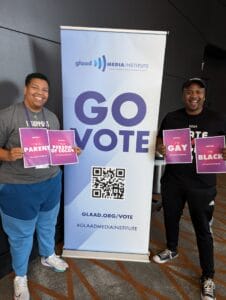As part of its education and advocacy programming across the country, the GLAAD Media Institute, GLAAD’s training, research and consulting division, convened meetings with local leaders and community advocates throughout the nation. Attendees who complete a program or session with the GLAAD Media Institute are immediately deemed GLAAD Media Institute Alumni, who are equipped to maximize community impact by leveraging their own story for culture change.
Now, these GLAAD Media Institute Alumni, put into a complicated position post-election, will have to look to the power of their voices, votes, and organizing around the local leaders they have voted into their hyper local, federal, and state elections. The actions alumni take will help ensure that measures like marriage equality, reproductive freedom, transgender healthcare, and LGBTQ equality remain the highlight of the 2025 election.
Under the president-elect, LGBTQ rights are likely to be attacked. GLAAD’s accountability tracker found that President-elect Donald Trump has made more than 225 attacks on LGBTQ people. The 45th president recently came out with a video stating “on day one, I will revoke Joe Biden’s cruel policies on gender-affirming care — ridiculous. I will sign a new executive order instructing every federal agency to cease all programs that promote the concept of sex and gender transition at any age.”
Other forms of discrimination woven into law could look like increased book bans, “don’t say gay/trans,” forced outing, and rollbacks on DEI including Title IX. While many of these attacks on gender and sexuality have been in practice, under the new administration and congress, circumstances will change. Yet, activists say, like GLAAD’s CEO and President Sarah Kate Ellis has said: “We have been here before,” and they don’t plan on stopping progress now.
New Jersey
In New Jersey, GLAAD Media Institute Alumni at Garden State Equality, almost saw their state flip. It would have been the first time since 1988. Since then, New Jersey has become the home of some of the most progressive LGBTQ laws in the country.
For Christian Fuscarino, executive director of Garden State Equality, his mission is to keep protection in place.

“It is critical for LGBTQ+ organizations to meet this moment with resilience and action,” Fuscarino told GLAAD. “At Garden State Equality, we drew on our communications training from GLAAD to respond swiftly and effectively to protect our community. In less than 24 hours of a Trump victory, we had communications with resources, statements, policies explaining protections, and programmatic gatherings out the door. Our commitment to stand strong, amplify our voices.”
Fuscarino thanked GLAAD for assisting in their statewide efforts to protect LGBTQ community members, specifically transgender, nonbinary, and gender diverse community members. The executive director and his team have been fighting more than two dozen of New Jersey’s school districts who’ve abolished their transgender guidance policy 5756, or replaced the suggested guidance with “forced outing” policies that are currently being challenged by the state government.
“Maybe I’m just grasping for meaning, but there’s a bitter irony that we’re celebrating our 20th anniversary as we head into darkness once more. It took us nine years to get from the founding of Garden State Equality to the legalization of same sex marriage in New Jersey,” Aedy Miller, Garden State Equality’s communications manager, said.
They talk about that victory being built on the progress made by groups like Jersey Pride, the Gay Activist Alliance in Morris County, Pride Center of New Jersey, the New Jersey Lesbian and Gay Coalition, The Center in Asbury Park and others.
Two decades on, Miller notices an entire “new crop of activists” motivated to fight for legal and lived equality.
“I’m proud to be part of the generation inspired by those who came before to do that transformative work. But, I’m even more proud to be part of an organization committed to empowering the young people who will lead the fight long after we’re gone,” Miller continued.
In the meantime, New Jersey continues to fight school boards believed to be going against New Jersey Law Against Discrimination.
The Garden State was not the only state where alumni continue to rise to the challenge.
Wisconsin
On election day, Wisconsin’s pro-LGBTQ candidates did not perform as well as activists, policy makers and public servants thought, yet progress was made for pro-LGBTQ candidates.
Ricardo Galaviz, executive director of the Milwaukee LGBTQ Community Center said they will only keep “organizing, advocating and ensuring that everyone feels seen, heard, and valued” at every level of government and in everyday life.

“Here at the Milwaukee LGBTQ Community Center, we’re committed to continuing the work—standing firm in our values, lifting up our community, and pushing forward with resilience and purpose. We know this journey isn’t easy, but our strength comes from knowing we’re not alone. Together, we will continue to create safe spaces, amplify voices, and offer unwavering support for those who need it most,” Galaviz said.
Earlier in the year, Gov. Tony Evers signed “Fair Maps” into law. The law was intended to redistrict heavily partisan, gerrymandered voting districts for fair, representative ones. The maps were a thimble of hope for Wisconsinites, lending to projected wins in the state legislature. While pro-equality candidates did not flip the state legislature, they won back 14 seats in the Wisconsin Assembly and Senate in the 2024 election. Additionally, a majority, and many of those wins in the Badger State, were LGBTQ+ Victory Fund endorsed candidates who won their races.
“Please know we’re here, standing beside you, ready to keep moving forward. Together, we will navigate these challenges, and we will find ways to thrive,” Galaviz went on to say.
Wisconsin’s neighbors over in Michigan had a similar message. This election season broke what was considered a historic “trifecta” in Michigan’s chambers of government.
Michigan
Jazz MicKinney, the executive director of the Grand Rapids Pride Center, said that “we are not alone.”
“We know that you are scared, angry, sad, confused, hopeless, and all other sorts of emotions, including numb. We are too. We know that the road ahead may be uncertain, but we also know that the strength of our collective voice has always been – and will always be – our greatest power,” wrote McKinney on behalf of the Grand Rapids Pride Center to Facebook.

“I will also add that we are in this fight everyday for queer, [two-spirit], and trans liberation, and yes, while certain presidencies can make this fight a little harder it doesn’t change our resolve and the work that we will continue to do no matter who is president,” said McKinney in an added statement to GLAAD.
On November 5, Michigan was certainly a state to watch.
The flip state was up in the air, and in part due to Israel’s impunitive assault on Palestine and Lebanon along with the current administration’s unwavering financial support of it. Even so, Michigan exit polls from November 5 showed voters shifted significantly toward Trump, who is both anti-Palestinian and anti-LGBTQ. Voters also shifted toward third party candidates from along the political spectrum.
Yet wins showed in other aspects of the election. Tyra Bolden, an LGBTQ ally, was reelected to Michigan Supreme Court, along with Kimberely Ann Thomas, who was endorsed by Equality Michigan’s Action Network, maintaining a pro-equality majority in the state’s highest courts.
Meanwhile, in New York, Proposal 1 passed by an overwhelming majority to add protections to the State Constitution’s Bill of Rights to prohibit discrimination on the basis of ethnicity, origin, age, disability, and sex, which includes sexual orientation, gender identity, pregnancy, and pregnancy outcomes.
New York
Ronald Hinton and Brandon C. Smith, GLAAD Media Institute Alumni and founders of the culture shifting, social justice oriented film festival, Queer Voices NYC, said that as they navigate this new normal, they remain deeply committed to our values in “uplifting BIPOC LGBTQIA+ voices in media that represent the diversity of this nation.”

“Our lives, stories and unique experiences matter and have significantly shaped American culture since its founding. Under this new administration, we will continue to protect our community by building coalitions that will support a positive future for the next generation,” said Hinton and Smith in a joint statement to GLAAD.
This year the GLAAD Media Institute will remain committed to assisting LGBTQ activists, organizers, and people to help their community through the power of using their story to speak to their audiences.













